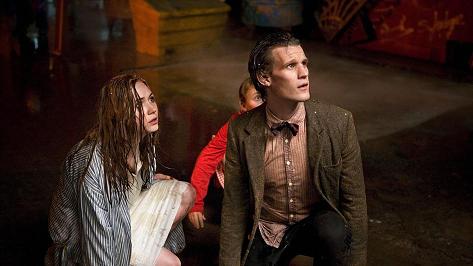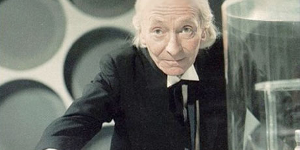 Last week, Matt Smith and Steven Moffat hit the ground running to kick off their era of “Doctor Who.” This week, things slow down a bit to a bit more of a leisurely stroll, allowing this new era to breath a bit.
Last week, Matt Smith and Steven Moffat hit the ground running to kick off their era of “Doctor Who.” This week, things slow down a bit to a bit more of a leisurely stroll, allowing this new era to breath a bit.
After getting a new Doctor, a new companion and a new TARDIS interior last week, it was nice to see the series take 40-minutes to catch its breath with a straight-forward story. We also get to see Karen Gillian and Matt Smith really stepping into and inhabiting their new roles, expanding on the glimpses of what we saw last week in “The Eleventh Hour.”
For her first trip in the TARDIS, the Doctor takes Amy forward in time 1300 years. The Earth has long since been destroyed by solar flares and the British Empire is now traveling through space as Starship UK. The Doctor decides to take Amy to explore the world and soon discovers that the empire hides a secret, not only from the Doctor but from its citizens. On their sixteenth birthday and then every five years after that, citizens are informed of the truth about their empire and allowed to either vote to protest or have the knowledge wiped from their minds. At one point, Amy undergoes the procedure and is then given a warning from herself not to let the Doctor explore or find out too much about what’s going on.
In many ways, “The Beast Below” has the feel of a classic era “Doctor Who” story combined with a greatest hits of Moffat’s previous stories. We have hidden warnings ala “Blink” and menacing threat along the lines of the Clockwork Men in “Girl in the Fireplace” or the gas mask children from “The Empty Child” and “The Doctor Dances.”
And while the story itself is straight-forward enough, the real meat hangs on watching Smith and Gillian in their respective roles. Smith settles into his role as the Doctor, losing a bit of the manic edge he had last week and becoming a far more enigmatic character. At times, Smith seems to be channeling the spirit of Patrick Troughton’s take on the Doctor. There’s a childish wonder shown when the TARDIS first arrives on Starship UK that later turns into dark anger when the Doctor discovers the true secret of what’s going on and the implications of Amy’s decision to wipe the knowledge from her mind and to leave messages to encourage her to make the Doctor leave.
The story allows enough time for both Smith and Gillian to have a showcase moment or two, which after a year or so of specials and huge, series-changing, overstuffed epic stories, a nice quieter, more traditional “Doctor Who” story is a welcome change of pace.
However, I do have some minor quibbles with the ending, namely that the solution to the problem doesn’t come from the Doctor himself but from Amy. The solution works, but I still find the new series to have a bit too much over-reliance on the companion to provide the solution that the Doctor could or should come up with himself. If anything, having the Doctor be as single-minded in seeing only one worst-case solution to the problem at hand feels like the story wants to justify keeping Amy around after the Doctor threatens to take her home and leave her behind once this adventure has concluded.
After seeing the Doctor use his wits and intelligence to defeat the problem last week, this week’s ending stands out like a bit of a sore thumb.
Thankfully, Moffat doesn’t end the story there, but casts long-time “Who” fans back to the early days of the show when each story dovetailed into one another. The final few minutes tease next week’s installment and will likely have most fans buzzing on what’s to come next week.





Just a quibble – the Earth wasn’t destroyed by solar flares, just made uninhabitable: they plan on returning when (as the Doctor says) the weather gets better.
I do have to say that I’m surprised how how exposition-laden these past two Moffat scripts have been. I mean, did we really need Amy to explain that she figured out what was going on based on her observation of the Doctor? I expected tighter scripts given Moffat’s abilities.
That said, it’s still Doctor Who and still makes me happy when I watch it.
I actually found the ending with Amy figuring out the solution kind of good. For who knows how long the Doctor has been traveling without a companion and has lost the humanizing quality that comes with that.
So when he only sees the black and white solution and misses the simple emotional one it seems to be a reflection of the Great and Terrible Doctor that we saw at the end of the last year of specials.
As for the “exposition” I think it comes down to Amy recognising something in the Doctor and trying to make him see it about himself, to try and help him regain his “humanity”.
I agree with jsbigman. It is very true that we often fail to understand our own motivations. The Doctor may have not been embarrassed by his immediate breach of his very own ‘don’t get involved speech, but he certainly glossed over it without digging deeper as to why this particular case (and cases like it) allows for the exception to the rule. Sometimes we need to have mirrors held up to our own faces.
Moffat himself didn’t write this episode, though he likely did a pass on the script.
As for Amy coming up with the solution instead of the Doctor: Michael, you say it’s an excuse for the Doctor to keep her around after threatening to boot her, but it’s really justifying reasons why he needs a companion around at all, full stop. And… I’m trying to think of a way to describe this without being spoilery… I think it was done very well, and it’s made clear that Amy is able to figure out what’s going on before the Doctor because she’s seen this kind of situation play out before and he hasn’t, not really.
As for Amy providing the solution… I really got the impression that the Doctor was testing her. (Spoiler ahead) I never for a moment believed he was actually going to kill the starwhale. He wanted to test Amy’s mettle before making the final decision of whether to take her back or keep her aboard. Think about what you know of the Doctor from all his past adventures. Would he really kill the creature? It goes against all that he is to solve the problem that way. I really think he was pushing Amy to see if she’d come up with the answer that he already knew was the right one.
^^ Wait, scratch my above comment, Moffat did write this one. He didn’t write next week’s, though, that’s Mark Gatiss.
maluba, not sure where you’re getting that from. I didn’t think it was implied at all.
I don’t think it was implied within the episode itself. I think it’s implied by the character of the Doctor, and what he would or wouldn’t do. It wouldn’t have been like him at all to kill an innocent creature to solve the problem.
What I think I liked best about this episode was that it kept to a nice pace and was interesting to boot.
Great episode but I just don’t buy that Amy would have understood the Doctor’s character so soon after meeting him, The entire final decision, one on which rests the lives of millions of people and a star whale, rests on Amy being very familiar with the Doctor’s essential nature (old and very kind) that doesn’t ring true so early in the series. But, I think if this episode had been placed later in the series i would have accepted this element better and liked the episode more.
I only thought that the episode was OK. The idea was good but it felt like the whole script need another rewrite. The ending also felt very rushed.